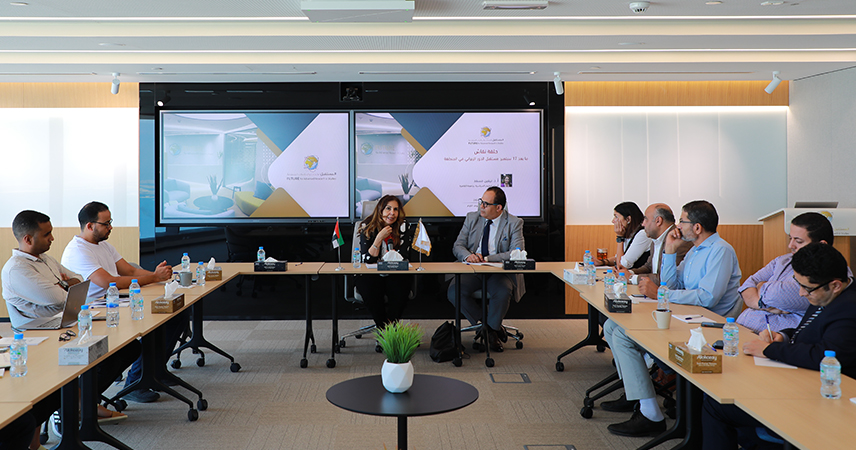In the wake of the seismic shifts experienced by the Middle East region across security, political, and strategic domains since the eruption of the Israeli war on the Gaza Strip on October 7, 2023, and the subsequent regional escalation on multiple fronts, Future Center for Advanced Research and Studies (FARAS) convened a pivotal discussion panel on September 19, 2024. The discussion delved into the future of Iran's role in the region, with particular emphasis on the aftermath of the "Pager" bombings in Lebanon on September 17.
The panel featured Professor Dr. Nevin Masoud, a distinguished Professor of Political Science at the Faculty of Economics and Political Science at Cairo University, as the keynote speaker. Professor Ahmed Aliba, Head of the Security Studies Unit at FARAS moderated the proceedings, which were further enriched by the participation of experts and researchers from FARAS, contributing their insights to this critical discourse.
Post-September 17
The events of September 17, 2024, which involved the simultaneous detonation of approximately 3,000 pagers in the bodies of Lebanese Hezbollah members, are now considered the "September 11 of the Middle East." This reference draws a parallel to the events of September 11, 2001, in the United States of America, which caused a major upheaval in the Middle East with repercussions that continue to this day.
Iran's role in the region following the September 17 events is intricately linked to a set of major factors and variables that it may face in the coming periods. Dr. Nevin Masoud identified these factors as follows:
Since October 7, 2023, the Palestinian issue has become unprecedentedly complex and intertwined. This complexity is exacerbated by Israel's complete and explicit rejection of the two-state solution, particularly with right-wing parties currently controlling the Israeli government. Consequently, Iran finds itself in a major predicament regarding the Palestinian issue and the principle of a two-state solution. The situation in the Gaza Strip is inextricably linked to events in the West Bank, with the latter presenting an even more dangerous scenario. The West Bank holds strategic importance for Israel, evident in ongoing settlement plans, house demolitions, land confiscations, and resident expulsions. These actions indicate a complete restructuring of the West Bank, further intensifying the crisis surrounding the Palestinian issue.
Regarding post-war arrangements for Gaza, there exists a common denominator among the visions and proposals of most major powers. They unanimously emphasize the necessity of Hamas's departure from the political scene and exclusion from any future arrangements, regardless of the form and nature of the new government. This development may significantly affect Iran, as its relationship with the potential new authority is unlikely to mirror its current rapport with Hamas. Consequently, Tehran may face a different political landscape in Gaza than it has been accustomed to.
Despite some decisions indicating a degree of optimism – including rulings by the International Criminal Court and the International Court of Justice against Israeli practices and Prime Minister Benjamin Netanyahu, as well as global sympathy for Palestine and recognition of the Palestinian state by some countries – these factors exert minimal pressure on American or Israeli decision-makers. Their relative influence remains insignificant compared to other factors shaping the current geopolitical equation.
2- The superiority of Israeli deterrence capabilities:
The recent escalation between Israel and Iran has demonstrated the clear superiority of Israeli deterrence capabilities. This is evident despite the success of missiles possessed by armed actors and Tehran's agents in threatening Israel and reaching Tel Aviv, as well as their ability to intercept Israeli ships in the Red Sea.
The events of September 17 starkly revealed the extent of the technological and intelligence gap between Israel on one side, and Iran and its allies on the other. Furthermore, a series of successive political assassinations targeting Iranian figures or those affiliated with Tehran has underscored this disparity. Over the past months, Israel has successfully eliminated no fewer than 17 leaders of the Iranian Revolutionary Guard, including those who held significant weight and influence within the organization.
Israel's qualitative superiority serves as a powerful deterrent to Tehran and its regional proxies. These recent developments have also challenged the long-held notion that "Israel must think twice before attacking Iran." In fact, the current situation suggests quite the opposite: it is now Iran that must carefully consider its actions, thinking twice or even thrice before responding to Israel.
3- Taking caution against expanding the scope of the war:
A consensus exists among regional and international parties to avoid entering into an expanded and comprehensive conflict, as evidenced by statements from American, European, Israeli, and Iranian officials. Consequently, Iran faces a complex dilemma in addressing its challenges while operating within a framework where it lacks a balance of deterrence and is simultaneously committed to not expanding the rules of engagement. For instance, Iran must respond to the assassinations and security breaches it has experienced; however, it is constrained by the superiority of Israeli deterrence. Furthermore, any expansion of the war's scope would risk antagonizing both regional and international countries, further complicating Iran's strategic position.
Urgent Questions
The ongoing interactions in the region and the nature of Tehran's movements raise critical questions about the future of the Iranian role, necessitating the examination of several hypotheses. Dr. Nevin Masoud elucidates these as follows:
1- The erosion of Tehran's image and status:
Iran's credibility and its position as the leader of the so-called "Axis of Resistance" in the region face scrutiny a year after the Israeli war on Gaza. Tehran has consistently strived to portray itself as a "defender of the rights of the oppressed" and a coordinator among various forces. However, this image has been significantly tarnished due to several factors including the failure to retaliate for the assassination of Hamas political bureau chief, Ismail Haniyeh, in Tehran in late July, as well as the recent events in Lebanon, both on September 17 and in the surrounding period, considering Hezbollah's crucial role in Iranian strategy and its position as a key agent in Tehran's regional equation.
Consequently, Iran's reputation as a coordinator of the "support fronts" within the framework of the "unity of arenas" principle has been severely compromised. This decline raises questions about Iran's ability to address the growing rift and diminishing credibility. Tehran's efforts to restore its image may face constraints, primarily due to the reluctance of major powers to expand the scope of the war, and Iran's lack of sufficient deterrence tools in the face of Israel's qualitative superiority.
2- Continuing to employ the Palestinian card:
The Palestinian issue has been a cornerstone of Iran's foreign policy since the Islamic Revolution. Tehran's commitment to this cause is evident through various actions such as severing diplomatic relations with Israel, converting the Israeli embassy into a Palestinian embassy and presenting it to the Palestine Liberation Organization, and establishing an annual Jerusalem Day.
These moves underscore Iran's adept use of the Palestinian issue in its foreign policy. However, this raises a pertinent question: If Tehran's ability to support the Palestinian cause diminishes, will it weaken Iran's capacity to utilize this issue in its foreign policy?
It may prove challenging to completely strip Iran of this diplomatic asset, especially given the declining involvement of some regional powers, particularly Turkey, that previously competed for influence in this arena. Conversely, if Iran uses the Palestinian issue as leverage for other priorities, such as the nuclear agreement—which holds greater importance for Tehran—it could impact its credibility. This is particularly relevant considering perceptions that pressure on Iran to avoid escalation and comprehensive confrontation may be linked to setting the stage for negotiations with the United States regarding the nuclear agreement.
The critical question that emerges is: If Iran's ability to influence the Palestinian issue declines, to what extent will this impact the momentum to revive the nuclear file?
In conclusion, the discussion yielded several significant insights, primarily highlighting that the "Pager" bombings and their aftermath underscored the imperative to critically examine and reassess the evolving mechanisms of engagement and methods of armed conflict that have transcended traditional approaches. The increasing influence of modern technologies in managing and shaping conflicts has become an undeniable reality.
Recent developments have also cast doubt on Iran's projected image of power, suggesting that its actual capabilities may not align with its promoted narrative. However, it is improbable that the ongoing regional dynamics and transformations will prompt Iran to adopt an isolationist stance, particularly given its persistent promotion of a narrative centered on external threats and dangers.
Furthermore, the future of Tehran's proxies is not entirely contingent upon Iran's influence. These agents have gradually amassed their own power and developed distinct interests, implying that a potential weakening of Iran's position does not necessarily equate to the complete withdrawal of these actors from the regional stage.



